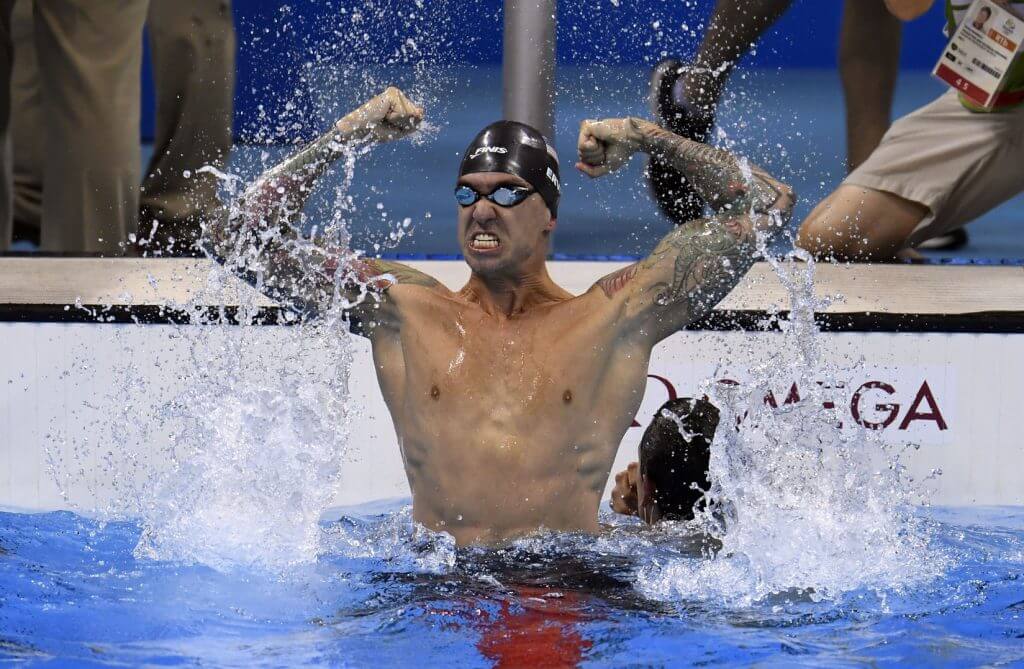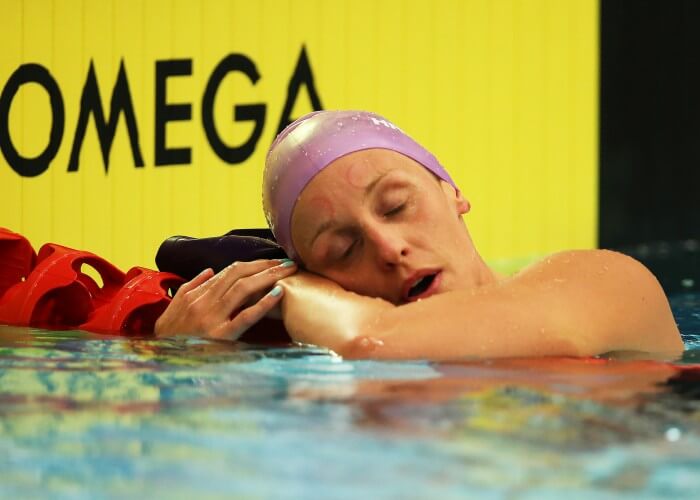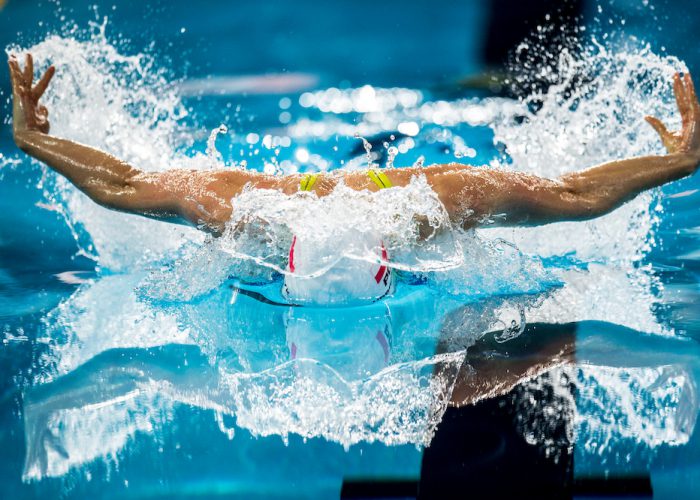7 Reasons Why a Swimmer’s Strength – Physical and Mental – is Unmatched

By Maggie Lasto, Swimming World College Intern.
The sport of swimming requires high levels of both physical and mental strength, calling to a special type of person. If you know a swimmer or are one yourself, you can consider yourself lucky. Swimmers affect the people around them and can teach us all life lessons. Here are seven reasons why swimmers are some of the strongest people you will meet.
1. They don’t escape pain – they welcome it.
Swimming is not easy. Unless it’s taper time, you rarely hear the words, “I feel great!” spoken on a pool deck. It’s a sport where throwing up at practice is a point of pride and labored breathing is a sign that they left everything in the water. When their face is burning hot, their arms feel heavy, their legs wobbly and a sharp pain hidden beneath their ribs, this is when a swimmer will say they’ve had a great practice. This is what they strive for. As Olympian Katie Ledecky says, “I just like the feeling of a hard workout.”
2. They know that the “easy way out” isn’t an option.
Swimmers know how to push themselves. When their lungs are burning going into a turn, they hold their breath to make that breakout stroke, knowing that next turn will be a little easier. When they’re exhausted at 5. a.m., they jump in the ice-cold pool anyways, knowing practice will only make them stronger. It is moments like these when we are able to ignore the negative voice chirping in our head and believe that we become successful. The video Rise and Swim captures the essence of what it means to truly be immersed in “the grind”.
3. Perseverance is their key attribute.
Day in and day out, swimmers chase best times, strive for qualifying cuts and reach for competitors seeded above them; yet, in just .01 seconds, these goals can be crushed. Competitive swimming gets its name for a reason – swimmers love to race and hate to lose. They will keep working towards those times every practice and every meet until they succeed. Setbacks and losses motivate them and fuel their desire to work even harder.
4. Sleep? They don’t know it.

Photo Courtesy: Ian MacNicol
Waking up in the pitch black to attend practice before morning classes mixed with afternoon workouts, meets, lifting, homework, studying, eating, clubs and everything else college swimmers are required to complete in a day, there is little time for sleep. Swimmers function at such high levels and push their bodies past their limits, even while sleep-deprived. They learn to squeeze puffy eyes into goggles, tired bodies into tight suits and bed-head into swim caps. When their peers and friends are tucked in their sheets sound asleep, this is when swimmers get to work.
5. They don’t get days off.

Photo Courtesy: Emily Magnavita
In the sport of swimming, there is no such thing as a day off. College athletes train year-round: often twice a day, six days a week. Day after day, they make the water their home, swimming laps up and down the pool repeatedly. Many teams even practice through the holidays, swimming during Thanksgiving break and going on training trips in the winter. Due to practice, swimmers miss countless birthday parties, family gatherings, events with friends and an excessive amount of other occasions. It takes a strong-willed person to miss out on all these fun and exciting memories in order to make themselves better at something they love. According to 60 Minutes, Michael Phelps practiced every day for five years prior to winning eight gold medals at the 2008 Beijing Olympics.
6. They’re self-confident.

Photo Courtesy: Foto Giorgio Scala / Deepbluemedia /Insidefoto
“It’s what you do with the rough patches that will define the athlete that you’ll become,” says Olympic gold medalist Dana Vollmer. Swimmers spend the majority of their time with their heads in the water, their senses deprived, and only the voice in their head keeping them occupied. They know that they can push themselves past their limits, overcome challenges, and accomplish amazing things. They know how hard they’ve worked, the time they’ve put in, and how far they are still going to grow. In a sport like swimming where you break your own boundaries constantly, you also learn more about yourself than you ever thought possible.
7. When busy and overwhelmed, they push through.
Swimmers know how to balance a busy work load and can manage even the craziest of days. With four to five hours a day spent in the water and the weight room, it is crucial that they use their time wisely. Practice allows them to let go of what is causing them stress for a little while and requires them to focus on the task at hand. By learning to prioritize their daily tasks, they are able to accomplish more and keep their mind healthy at the same time.
A swimmer is a unique type of person who is far stronger than most people you know. The next time you watch a swim race, meet a swimmer or read about someone’s accomplishments, consider what it took them to get where they are. That swimmer is doing the things most others refuse to and knows what it feels like to be let down. That swimmer has overcome more obstacles in their life than imaginable and is working to better themselves. A swimmer is physically strong but mentally stronger. Remember that and work towards it!
All commentary are the opinion of the author and do not necessarily reflect the views of Swimming World Magazine nor its staff.




Tony!
You guys still need to get off the lane lines.
Liam Jr Sheedy
So true!
?
Nagy Benedek Barnabás Nagy
Aaron Tarr
Love it Maggie!!! Well done.
Maggie, once again raising the bar! Great Article!
Reading this makes me so so proud of my daughter, Rachel Ahola Tyler who swam from the age of 9 and earned a college scholarship at a Division one school, and my Granddaughter, Chloe Tyler who has been swimming year round since age 7, and now a high school freshman is one of the top swimmers in Oregon. Love you guys and so proud of you❤️??❤️
Abdelrahman El-Ghoudy read this
Frank Habooji mad respect
Yes I throw up in the pool because I literally leave everything there
Full body workout, even your tongue is exercised.